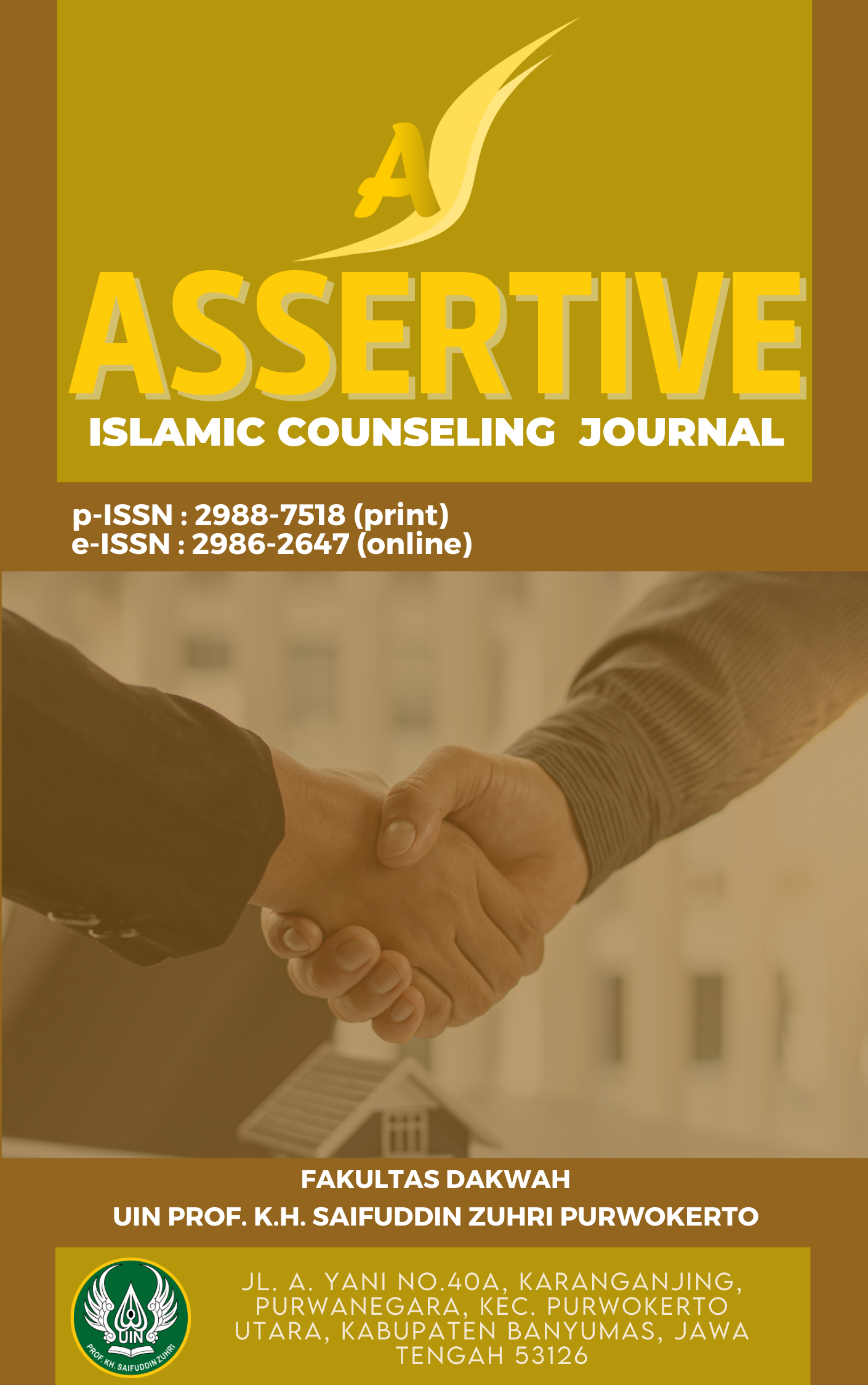The Token Ekonomy dalam Konseling Islam: Reduksi Perilaku Disruptif pada Siswa
DOI:
https://doi.org/10.24090/j.assertive.v1i2.7096Keywords:
perilaku mengganggu, ekonomi token, siswaAbstract
Disruptive behavior of students in schools is of particular concern to educators and education staff. Disruptive behavior can disturb the class situation, shouting, fighting, being late for class, not paying attention during the learning process, etc. Several studies explain the use of economic tokens. The use of positive and negative reinforcement in the application of economic tokens can be carried out in Islamic counseling services to reduce disruptive behavior in students. This study examines economic tokens in Islamic counseling to reduce disruptive behavior in students. This study uses a qualitative research approach with the method of literature study. The research was carried out by collecting all reading material related to the problem being discussed in this study, then understanding it carefully and thoroughly to produce a finding in the research. Data analysis of the conclusions of this study uses content or content analysis. The study results show that implementing the token economy can be used through Islamic counseling services to reduce disruptive behavior. Using the application of economic tokens can strengthen the desired behavior and reduce disruptive behavior in students. An understanding of the implementation of economic tokens is important before implementing economic tokens in Islamic counseling services.References
Disruptive Behavior dan Bentuk Perlakuan Guru. Indonesian Journal of Educational Counseling, 3(3), 199-219. https://doi.org/10.30653/001.201933.101
Amalo, A. G., & Widyastuti, A. A. (2021). Pengaruh Penggunaan Token Ekonomi dalam Menurunkan Perilaku Disruptif Anak Usia 4-5 Tahun. Jurnal Obsesi: Jurnal Pendidikan Anak Usia Dini, 5(1), 500-507. DOI: 10.31004/obsesi.v5i1.622
Andina, N. l. (2021). Teknik Pemodelan untuk Mengurangi Perilaku disruptif pada anak. PROCEDIA: Studi Kasus dan Intervensi Psikologi, 9(2), 50-54. DOI: 10.22219/procedia.v9i2.15784
Basir, U. A., & Astutik, S. (2018). Bimbingan Dan Konseling Islam Dengan Teknik Token Economy Dalam Membentuk Disiplin Shalat Pada Anak Di Sidoarjo. Jurnal Bimbingan Dan Konseling Islam, 8(1), 86-100. https://doi.org/10.29080/jbki.2018.8.1.86-100
Campbell, A. & Rodrigues, B. J., Anderson, C., & Barnes, A. (2013). Effects of a Tier 2 Intervention on Classroom Disruptive Behavior and Academic Engagement. Journal of Curriculum and Instruction, 7(1), 32-54, https://doi.org/10.3776/joci.2013.v7n1p32-54
Christian, S., & Hidayat, D. (2020). Peran Guru dalam Menangani Perilaku disruptif (Disruptive Behavior) Siswa pada Proses Pembelajaran di Kelas, Diligentia: Journal of Theology and Christian Education, 2(3). http://dx.doi.org/10.19166/dil.v2i3.2374
Danandjaja, James. (1997). Metode Penelitian Kepustakaan. Jurnal Antropologi Indonesia 52, https://doi.org/10.7454/ai.v0i52.3318
Doll, C., McLaughlin, T. F., & Barretto, A. (2013). The Token Economy: A Recent Review and Evaluation. International Journal of Basic Applied Science, 2(1), 131-149
Fiyati, S. U. (2019). Konseling Islam melalui token ekonomi dalam upaya meningkatkan konsentrasi belajar pada seorang anak ADHD (Attention Deficit Hyperactivity Disorder) di SLB C Kemala Bhayangkari 2 Gresik (Doctoral dissertation, UIN Sunan Ampel Surabaya). http://digilib.uinsby.ac.id/29185/
Ghazi, Rehman, S., Shahzada, G., Tariq, M., & Khan, A. Q. (2013). Types and Causes of Students’ Disruptive Behavior in Classroom at Secondary Level in Khyber Pakhtunkhwa, Pakistan. America Journal of Educational Research, 1(9), 350-354. https://doi.org/10.12691/education-1-9-1
Hefen, C.A., Ruzek, E. A., Gregory, A., Allen, J. P., & Mikami, A. Y. (2015), Focusing on teacher-student interactions eliminates the negative impact of students’ disruptive behavior on teacher perceptions. International Journal of Behavior Develompment, 39(5), 426-431. https://doi.org/10.1177/0165025415579455
Martin, G., & Pear, J. (2015). Behavior Modification: What It Is and How to Do It 10th Edition. New York and London: Routledge Taylor & Francis Group
Martin, G., & Pear, J. (2019). Behavior Modification: What It Is and How to Do It 11th Edition. New York and London: Routledge Taylor & Francis Group.
Matson, J. L., & Boisjoli, J. A. (2009). The Token Economy for Children with Intellectual Disability and/or Autism: A Review. ELSEIVER: Research and Development Disability, 30, 240-248. https://doi.org/10.1016/j.ridd.2008.04.001
Miltenberger, R. G. (2012). Behavior Modification: Principles and Procedures, Fifth Edition. United States of America: WADSWORTH Cengage Learning.
Putri, Priskila Indah & Widiastuti, Ajeng Ayu (2019) Meningkatkan Konsentrasi Anak Attention Deficit Hyperactivity Disorder (ADHD) dengan Pendekatan Reinforcement melalui Metode Bermain Bunchems. Jurnal Obsesi: Jurnal Pendidikan Anak Usia Dini, 3(1), 207-213. DOI: 10.31004/obsesi.v3i1.177
Prima, E., & Lestari, P. I. (2019). Penerapan Token Economy untuk Meningkatkan Perilaku Prososial Anak Usia Dini. Jurnal Obsesi: Jurnal Pendidikan Anak Usia Dini, 4(1), https://doi.org/1031004/obsesi.v4i1.324
Putri, P. I., & Widiastuti, A. A. (2019). Meningkatkan Konsentrasi Anak Attention Deficit Hyperactivity Disorder (ADHD) dengan Pendekatan Reinforcement melalui Metode Bermain Bunchems. Jurnal Obsesi: Jurnal Pendidikan Anak Usia Dini. 3 https://doi.org/10.31004/obsesi.v3i1.177
Ramaita, Purba, J.M., & Putri, D. E. (2018). Effect of Token Economy Therapy for Reducing Attachment Behavior Among Pre-School Children in Kindergarten. Elevate, The International Journal of Nursing Education, Practice and Research, 1(1), 70-75. https://doi.org/10.25077/elevate.1.1.70-75.2018
Ratnasari, F., Yulsyofriend, Y., & Rakimahwati, R. (2020). Pengaruh Metode Token Economy Terhadap Disiplin Anak Usia Dini di Taman Kanak-kanak. Jurnal Ilmiah Pesona PAUD, 7(2), 86-99. https://doi.org/10.24036/100292
Sarafino, E. P. (2012). Applied Behavior Analysis: Principles and Procedures for Modifying Behaviorthe. United States of America: John Wiley & Sons, inc.
Shakespeare, S., Peterkin, V. M. S., & Bourne, P. A. (2018). A token economy: an approach used for behavior modifications among disruptive primary school Children. MOJ Public Health, 7(3), 89‒99. https://doi.org/10.15406/mojph.2018.07.00212
Susila, I. K. D. (2019). Reinforcement Used In Teaching Young Learners. Widya Accarya, 10(2). DOI: https://doi.org/10.4665/wa.10.2.771.%25p
Wicaksono, T. H. (2013). Perilaku Mengganggu Di Kelas. Jurnal Paradigma, 15(8), 115-130. https://journal.uny.ac.id/index.php/paradigma/article/view/337
Downloads
Published
How to Cite
Issue
Section
License
Copyright (c) 2022 Lina Dwi Puryanti

This work is licensed under a Creative Commons Attribution 4.0 International License.









